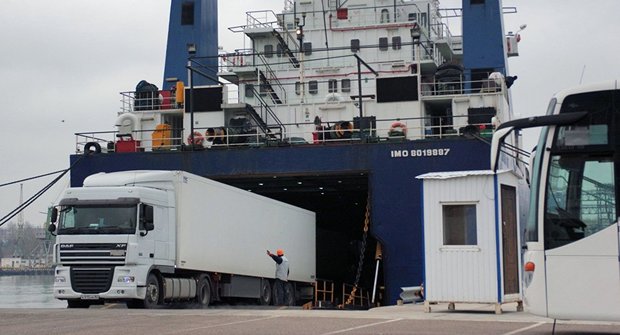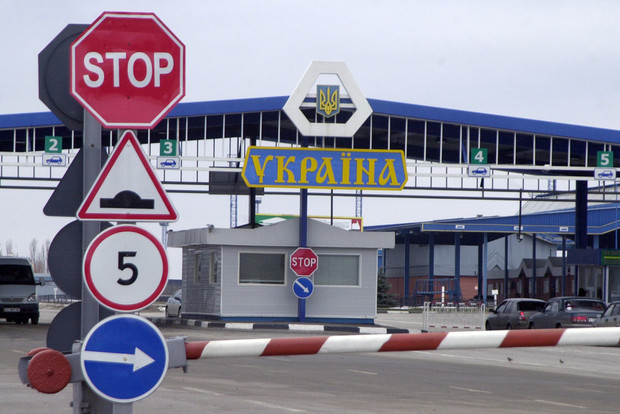Right Sector gave a 'vacation' to Tatarstan truckers at Belarus border
Ukraine has practically joined the Turkish-Polish road blockade of Russia
If at the end of the last week, lorries with Russian license plates were detained by some 'activists' on the territory of Ukraine, on Monday the Ukrainian authorities officially closed the country for the transit of Russian hailers. Hailers suppose Poland has a hand in it and is trying to put pressure on Russia to change its legislation and to receive preferential treatment for their companies. The only remaining route to Europe — by ferry across the Baltic Sea — is overloaded. The correspondent of Realnoe Vremya investigated the situation.
The are no Tatarstan citizens in Ukraine, they are all at the border
At the end of last week Russian truckers were practically blocked in Ukraine. Ukrainian activists began stopping trucks with Russian license plates. The action started in Transcarpathia and spread to Lviv oblast and Volyn oblast. It concerned trucks going to Slovakia, Hungary and Belarus. On Monday, the Ukrainian authorities announced a ban on the transit of Russian trucks through the territory of the country. The long queues at Ukrainian borders with Slovakia and the Republic of Belarus started to increase.
As Aleksander Lindval told Realnoe Vremya, the representative of the Association of International Hailers in Kazan, there are no Tatarstan lorries (at least, joining ASMAP — the Association of International Truck Haulage) on the territory of Ukraine, but the Republican carriers are still blockaded.
'There are no members of ASMAP from Tatarstan in Ukraine, but they gathered in masses at the entrances to Ukraine from Belarus with export and from the Slovak Republic with import,' told Lindval. 'There are about twenty of them. From Belarus there are trucks for export of Nizhnekamskneftekhim. But mostly they are with import. From Italy — household appliances, Germany – equipment. But some trucks are still in Germany, they had loaded in Italy and are waiting the command where to go. Maybe, to go through Denmark and Sweden by ferry to Latvia.
The hailers themselves confirm the fact of blockade of Tatarstan trucks at the border.
'The trucks are at the border and from the European side, and from Belarus,' told Ramil Latypov, the director of Redy Ltd. 'There are almost 15 lorries.'
Ukraine has blocked last direct route to Europe for Russian trucks. Together with Poland, the country has started a blockade for Russian overland transportation: these two countries block all Europe from Sea to Sea.
'Now there is a route through Latvia by ferry to Sweden, and there, across the bridge – to Denmark and Germany,' told Aleksander Lindval. 'But it is another route, it increases the cost of transportation almost by 50%. There is a route through Lithuania to Germany, but there are huge queues, not enough ferries. In the near future we were promised ferry in Baltiysk to put in the Kaliningrad region to Germany, but so far I have no information if it is there or not. But, again, they have to go through Lithuania to the Kaliningrad region – the line was huge.'
A route through ferry crossings with a blockade of land areas is not only expensive, but also very time-consuming: 'We cannot get to Europe. By ferry – a month of waiting,' says Latypov. Meanwhile, in social networks there are videos of kilometre traffic jams at the Lithuanian border.
Poland has a hand in Ukraine issue
In fact, the story with the Ukrainian borders started as soon as Russia and Poland failed to agree on the granting of permits for transport companies. As a reminder, Poland demanded Russia to amend the new federal law, limiting opportunities for fraud with documentation on freight and imposing European penalties for it. After that, the main stream of Russian trucks went through Belarus to Ukraine, bypassing troubled Eastern areas.
It is the position of Poland that is attributed to the emergence of the 'Ukrainian problem' by the representatives of transport companies. In their opinion, the Polish side started negotiations with the Ukrainian authorities to put pressure on Russia.

'This situation is directly connected with Poland,' thinks Ramil Latypov. 'A week before, lorries were passing as usual. Now, they're returning, they stalled from the Slovak side. Ukrainians just get the money from the Poles. There is no authority here.'
'We will not amend Russian legislation for 'wants and wishes' of Polish hailers'
At the same time, Poland continues to impede negotiations.
Poland were to come to Moscow last week, but taking into account the differences of transport ministries of Russia and Poland, they refused to come,' told Aleksandr Lindval. 'Forecasts: in February the meeting will be held — or this week, or next. We invited them, but they have not responded when they arrive yet. Our position is following: we will not amend the Russian legislation for 'wants and wishes' of Polish hailers. It is the position of Mintrans and our government. Almost all hailers support. By agreeing with the Polish side, by amending the Russian legislation, we will say a farewell to European cargo – all will transported by Poland.
According to him, it is better to resolve the issue with Ukraine as soon as we can. The response actions of the Russian authorities should favour it. Rostransnadzor has reported that due to the blockade of trucks on the territory of Ukraine, 152 trucks belonging to Ukrainian hailers were detained in Russia.
'I think the issue will be resolved with Ukraine after the government has decided to block Ukrainian trucks in Russia, not to allow the transit to Kazakhstan,' supposes Lindval. 'So, I think the issue will be resolved. This will help us to await the resolution of the Polish issue. And it will be solved definitely: neither we nor the Poles can deal without it.

The hailers are being even more determined:
'Let's go and catch the Ukrainians, hold our own Maidan,' played a joke Ramil Latypov, Director of Redy Ltd., but joking apart he is sure that the Russian side will be able to defend its position.
The hailers are sure that European partners of Russia, who are suffering from blockade, will not step aside:
'Where there is the blockade, trucks are going to Italy, Hungary, the Czech Republic, Slovakia. They [Ukraine – editor's note] will get their deserts. The Italians will arrange a big problem to them. The situation is quite extraordinary. Now they all want to shift blame. But primarily it's their fault. There is a sufficient number of permits for mutual border crossings with Ukraine. But these nerds from Right sector do not give a toss about the whole thing. They have stopped traffic. Now they say that the trucks will transit through the border with convoy.'
'Another dirty trick from their side'
However, the country is still under the road blockade. Turkish issue, although not as significant, also has not been resolved and is unlikely to be in near future.
'The Ministry of Transport for the second time has offered the Turkish side to exchange quotas,' said Aleksander Lindval. 'Turkey does not promise anything officially, unofficially information is that they refuse to exchange even for a year. To the first letter they replied that they would prolong the permits to January 2015. It was on 14 January. Turkish hailers knew that the extension would be, they loaded and stood at the border. Then the Turkish authorities announced that they extend. For 15 days they managed to transport their goods to Russia and to take what they need from Russia. And we didn't know that they would extend. Another dirty trick from their side.'
